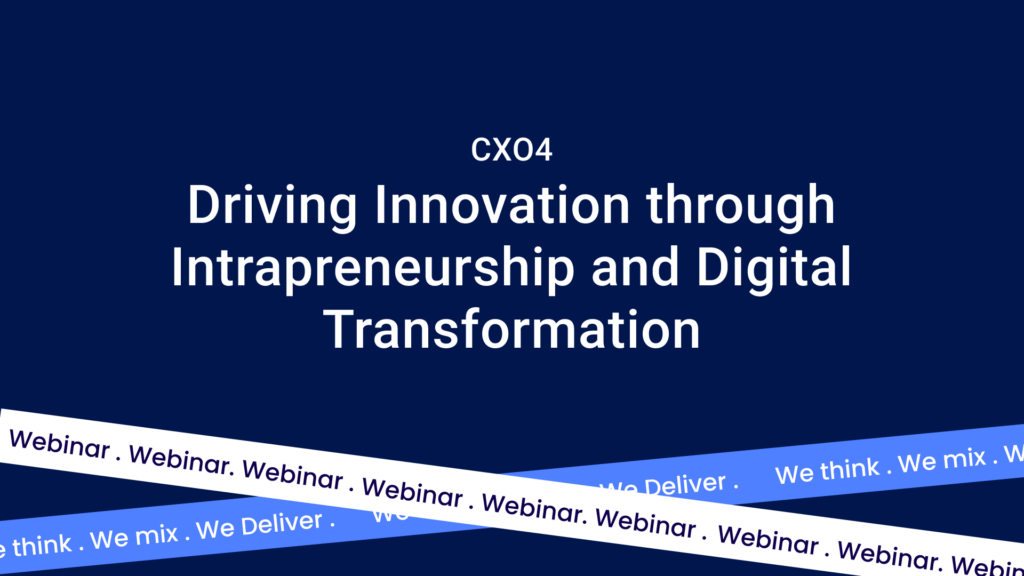In today’s rapidly evolving business landscape, the ability to drive innovation and navigate digital transformation is crucial for organizational success. Join our panel of industry experts as they share their insights and experiences on how intrapreneurship, the entrepreneurial mindset within organizations, can fuel digital transformation and foster innovation.
👥 About our amazing speakers

🎙️Carola Cazenave
Co Founder at COX4, Business Angel, and former Partner Ecosystem VP at Pega & IBM
🎙️ Gonzalo Amuchastegui
Digital strategist, Coach, Agile Leader, and founder at Amalgama
🎙️ Ana Zapiola
Chair Woman, CoS and Former CEO at Amalgama
🎙️ Travis Pomposello
Head of Growth & Innovation at Amalgama, Co-founder EPIX, CBS College Sports, and Discovery Kids Networks
💡 A few key highlights:
Intrapreneurship as a philosophy
The main distinction between an intrapreneur and an entrepreneur lies in the context and resources they operate within. Besides that, both of them share almost the same skills: being a good listener, working on understanding the needs of stakeholders, being a problem solver, demonstrating flexibility and autonomy, and possessing curiosity, resilience, proactivity, and adaptability.
Culture
Along the way, a horizontal structure provides the opportunity to foster initiatives and execute them effectively, allowing for constructive development.
Teams taking ownership of their work and understanding clients’ needs can provide better services and deliver enhanced value. Essential components such as constant communication, openness to feedback, a clear goal, and a shared vision of the company’s direction, along with transparent sharing of information like numbers, results, profit, and salaries, form the basis for informed decision-making and autonomy, contributing to the main endeavor.
Integrating micro individual learnings into the final value proposition plays a pivotal role in driving innovation, benefiting both clients and the overall business.
Resilience
Is one of the key skills an intrapreneur should possess inherently. When aiming to lead the competition, it’s inevitable that many endeavors may encounter setbacks. The important thing is not to cultivate a culture of punishment. Instead, avoid getting frustrated or demotivated, maintain composure, and rise again. Seek feedback to identify areas for improvement.
Sometimes, the improvement of a process may not achieve complete success. However, if 20% out of 100% worked, it still represents a 20% rate of success.
This progress means doing things better than before. While 100% success is ideal, 20% progress is far better than 0%. Don’t dwell on doubts about what could have been if you tried something different. Take action, learn from the experience, and gain valuable insights.
Have the right people at the right time
No company wants to stay stable; you always want more. To achieve this, everybody must understand our direction and be on board. Then you will go fast.
To avoid delays, everyone should know their roles, what we want to achieve, and how. Perfection is the enemy of progress, in a big company, you need more people on board, so clarity is crucial.
The key success factor is knowing who needs to do what. Don’t expect the full company to be involved; find the perfect people who can do it.
If you find what you’re seeing appealing, it’s only the start.
Explore the complete recorded session to uncover invaluable insights on digital transformation, leadership, innovation and intrapreneurship, among others!
👀 Watch here the full webinar:

Looking for a more laid-back way to enjoy it? You got it! You can kick back and listen to the webinar directly on Spotify. Here’s the link to the audio-only version.
📩 If you have any comments, or ideas you’d like to discuss with us, please feel free to reach out to us at hello@amalgama.co, or directly contact the speakers on their social.
Curious for more?
Subscribe to our Newsletter
Be the first to dive into the latest tech trends!
